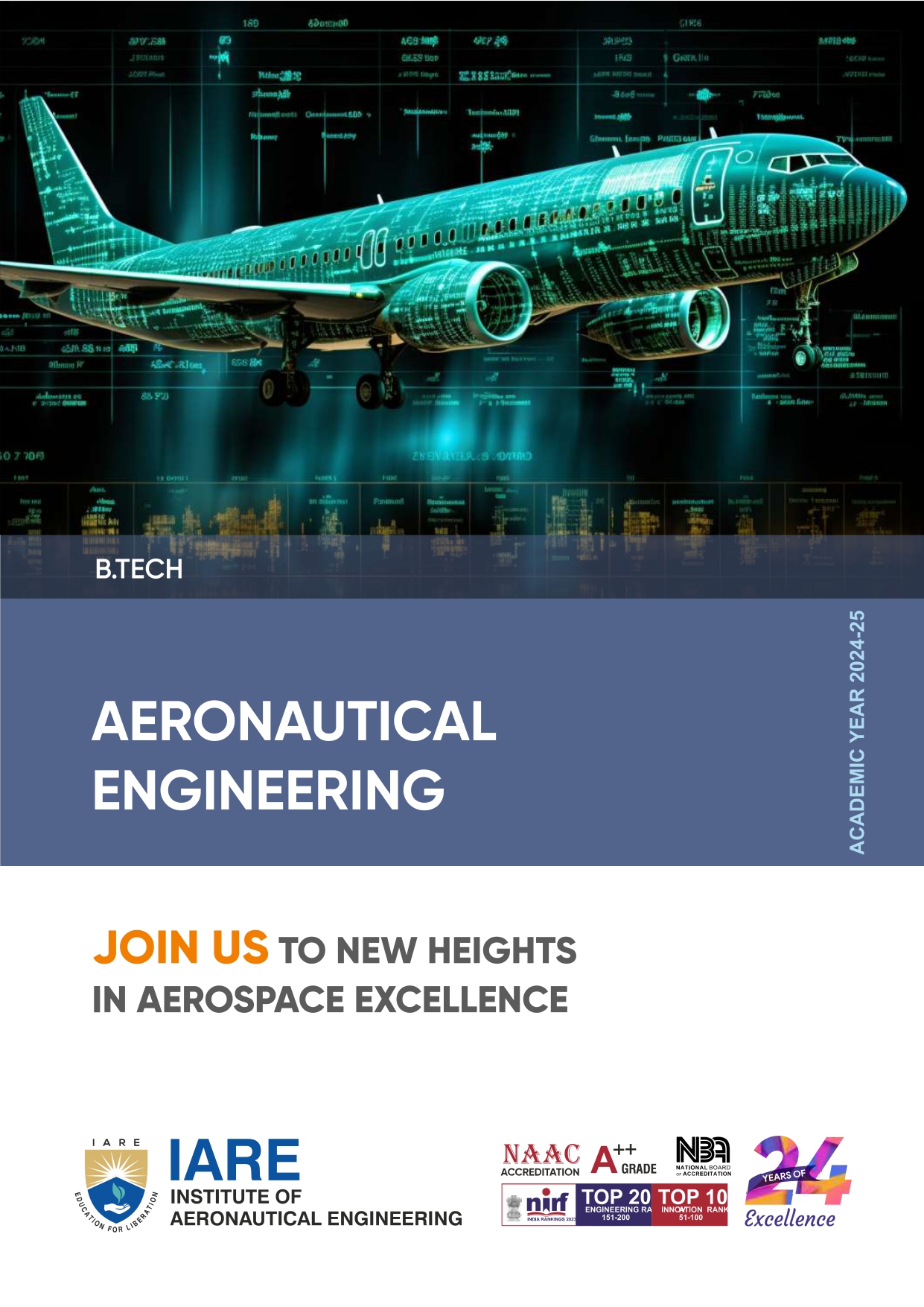Massive Open Online Courses (MOOCs) - M.Tech
It is one of the most amazing innovations in online learning over the past few years has been the growth and development of Massive Open Online Courses, better known as MOOCs. These courses (MOOCs) are the future of Quality Enhancement in Engineering Education (QEEE) and improve self-learning.
Generally speaking, MOOCs are college-level courses made available, free of charge or with nominal charges. At IARE, MOOCs are often offered from highly prestigious colleges and universities like Harvard, Stanford and, most predominantly, MIT, and taught by the same professors and instructors that teach them on their famous campuses and by a variety of private providers.
The students admitted under Autonomous status in M.Tech I Semester are required to complete one MOOC course by the end of the semester. Below you will find the course titles and links to some of the most popular MOOCs offered for M.Tech (AE) I semester during academic year 2016 - 2017:
Course Details
|
|
| MOOC procedure |
edX |
| Conducting Institute |
Massachusetts institute of technology |
| Instructor |
Lorna J. Gibson, Matoula S. Salapatas |
| Starting Date /Duration |
6 Weeks/ 09 November, 2016 |
| Website |
https://www.edx.org/course/mechanical-behavior-materials-part-3-mitx-3-032-3x-0 |
| Course Description |
This course is an introduction to the mechanical behavior of materials, from both the continuum and atomistic points of view. At the continuum level, we learn how forces and displacements translate into stress and strain distributions within the material. At the atomistic level, we learn the mechanisms that control the mechanical properties of materials. Examples are drawn from metals, ceramics, glasses, polymers, biomaterials, composites and cellular materials.
It also viscoelasticity (behavior intermediate to that of an elastic solid and that of a viscous fluid), plasticity (permanent deformation), creep in crystalline materials (time dependent behavior), brittle fracture (rapid crack propagation) and fatigue (failure due to repeated loading of a material). |
|
|
|
| MOOC procedure |
edX |
| Conducting Institute |
Delft University of Technology |
| Instructor |
Dr. Calvin Rans, MichielSchuurman |
| Starting Date /Duration |
01 November, 2016/ 6 Weeks |
| Website |
https://www.edx.org/course/air-safety-investigation-delftx-aeasm513x |
| Course Description |
In this course we will explore the challenges faced by investigators when trying to piece together the probable sequence of events. We will familiarize you with the investigative ways of thinking and forming of conclusions. In fact, you’ll learn to think and act as an air safety investigator.
Thought-provoking assignments test your observation skills, fact-finding skills and analytical skills. The assignments give you a taste of what investigators face during an investigation. Skills such as Inductive and Deductive reasoning are highlighted to explain the challenging process of air safety investigation. This professional course contains assignments, individual feedback and live online sessions.
Air safety investigations are complex and affect people from all over the world, with different backgrounds. This course is aimed at different target groups so you can experience different perspectives. We will focus on the legal framework behind air safety investigations world-wide, and the generic procedures followed when an aviation occurrence happens. |
|
|
|
| MOOC procedure |
edX |
| Conducting Institute |
The University of Queensland |
| Instructor |
DrAnandVeeraragavan, Dr Vincent Wheatley, Professor Michael Smart, Professor Richard G. Morgan |
| Starting Date / Duration |
9 Weeks / Self-Paced |
| Website |
https://www.edx.org/course/hypersonics-shock-waves-scramjets-uqx-hypers301x-2 |
| Course Description |
A flow is called hypersonic if the Mach number is greater than 5. This means that the flow speed is more than five times the speed of sound. In air at room temperature, the speed of sound is around 340 m/s, so a Mach 5 flow would have a flow speed of 1.7 km/s or just over 6,000 km/h. When a rocket launches a satellite into earth orbit, when a probe enters the atmosphere of another planet or when an aircraft is propelled by a supersonic combustion ramjet engine (a scramjet), hypersonic flows are encountered. Hypersonics – from Shock Waves to Scramjets introduces the basic concepts associated with flight at speeds greater than Mach 5 and takes students to the stage where they can analyse the performance of a scramjet engine that might be used in a future access-to-space system. |
|
|
|
| MOOC procedure |
edX |
| Conducting Institute |
Massachusetts institute of technology |
| Instructor |
Jeffrey Hoffman, Former NASA Astronaut |
| Starting Date / Duration |
8 Weeks/ 06 September, 2016 |
| Website |
https://www.edx.org/course/introduction-aerospace-engineering-mitx-16-00x-0 |
| Course Description |
The course will cover how rockets work, how spacecraft move in orbit, how we create artificial environments inside spacecraft to keep astronauts alive and healthy, what it’s like living in a world without gravity, how the human body adapts to space, and how spacewalks happen, plus more. Many lessons will be illustrated with Professor Hoffman’s own experiences in space. |
|
|
|
| MOOC procedure |
edX |
| Conducting Institute |
Massachusetts institute of technology |
| Instructor |
Michael Burton, Mark Drela, Alejandra Uranga |
| Starting Date / Duration |
16 Weeks/ 09 November, 2016 |
| Website |
https://www.class-central.com/mooc/5416/coursera-advanced-converter-control-techniques |
| Course Description |
This course covers the physics, concepts, theories, and models underlying the discipline of aerodynamics. A general theme is the technique of velocity field representation and modeling via source and vorticity fields, and via their sheet, filament, or point-singularity idealizations.
The intent is to instill an intuitive feel for aerodynamic flowfield behavior, and to provide the basis of aerodynamic force analysis, drag decomposition, flow interference estimation, and many other important applications. A few computational methods are covered, primarily to give additional insight into flow behavior, and to identify the primary aerodynamic forces on maneuvering aircraft. |
|








 Work with Us
Work with Us Campus Map
Campus Map How to Reach Us
How to Reach Us Online Degree Verification
Online Degree Verification Photo Gallery
Photo Gallery